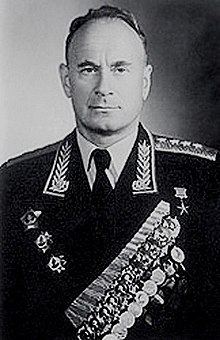Ivan Serov | |
|---|---|
Иван Серов | |
 | |
| 1st Chairman of the Committee for State Security (KGB) | |
| In office 13 March 1954 – 8 December 1958 | |
| Premier | Georgy Malenkov Nikolai Bulganin Nikita Khrushchev |
| Preceded by | Sergei Kruglov |
| Succeeded by | Alexander Shelepin |
| People's Commissar for Internal Affairs of the Ukrainian SSR | |
| In office 1939–1941 | |
| Personal details | |
| Born | Ivan Alexandrovich Serov Иван Александрович Серов 13 August 1905 Afimskoye, Kadnikovsky Uyezd, Vologda Governorate, Russian Empire |
| Died | 1 July 1990 (aged 84) Krasnogorsk, Moscow Oblast, Russian SFSR, Soviet Union |
| Political party | Communist Party of the Soviet Union (1926–1965) |
| Signature |  |
| Military service | |
| Allegiance | |
| Branch/service | NKVD MGB MVD KGB GRU |
| Years of service | 1923–1965 |
| Rank | |
Ivan Alexandrovich Serov (Russian: Ива́н Алекса́ндрович Серóв; 13 August 1905 – 1 July 1990) was a Soviet intelligence officer who served as Chairman of the KGB from March 1954 to December 1958 and Director of the GRU from December 1958 to February 1963. Serov was NKVD Commissar of the Ukrainian SSR from 1939 to 1941 and Deputy Commissar of the NKVD under Lavrentiy Beria from 1941 to 1954.
Serov was active in organising NKVD activities against anti-Soviet forces during the Soviet Invasion of Poland and World War II, including the Katyn massacre. Serov issued the Serov Instructions and helped organise the mass deportations of people from Poland, Baltic states and the Caucasus. Serov helped establish secret police forces in the Eastern Bloc after the war and played an important role in suppressing the Hungarian Revolution of 1956.[1] Serov was removed from power in 1963 after his protégé, GRU Colonel Oleg Penkovsky, was exposed as a mole passing classified documents to both British and American intelligence. In retaliation, Serov was stripped of his position, rank, Communist Party membership and Hero of the Soviet Union award in 1965. He lived in obscurity until his death in 1990.